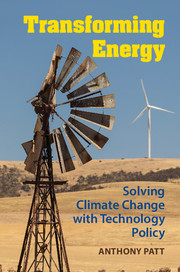PART 3 - SUCCESSFUL STRATEGIES TO MOVE US AWAY FROM FOSSIL FUELS
Published online by Cambridge University Press: 05 July 2015
Summary
I spent the last three chapters writing a depressing story. None of the things that people thought could solve climate change actually work. They don't work because they fail to stimulate the kind of innovation and the sequence of system change that we need. They don't work because they rely on a set of political institutions that simply don't exist and will not exist for decades. They don't work because they don't go far enough, probably can't go far enough, in reducing energy use and consumption. And they don't work because, at the end of the day, very few people want them.
It is time to turn things around. It is time to identify a pathway that can work, that can mean that the planet will be a good place for our grandchildren and those who follow.
The starting point is to identify a red thread, a red thread that differentiates the solutions that have not worked from those that have and that can continue to work in the future. In Chapter 7, I do that by drawing from theories of technological and social change. These contrast sharply with those theories that have informed climate policy so far. By and large, those theories spoke about a much more static world. The world is not static. More importantly, if we are to solve climate change, we must make the energy sector particularly dynamic.
In Chapter 8, I turn to consider specific technologies. What exactly are the technologies that we need to solve climate change? Do they exist already, or are they still a figment of our imaginations and an artist's rendering? There are plenty of the latter kind, and these may serve us well several decades from now. But there are also enough that exist in the here and now. They could solve climate change right now if there were not social factors standing in their way, such as their being slightly more expensive. But these are factors that will disappear quickly and, in some cases, have already ceased to be important.
- Type
- Chapter
- Information
- Transforming EnergySolving Climate Change with Technology Policy, pp. 149 - 150Publisher: Cambridge University PressPrint publication year: 2015



